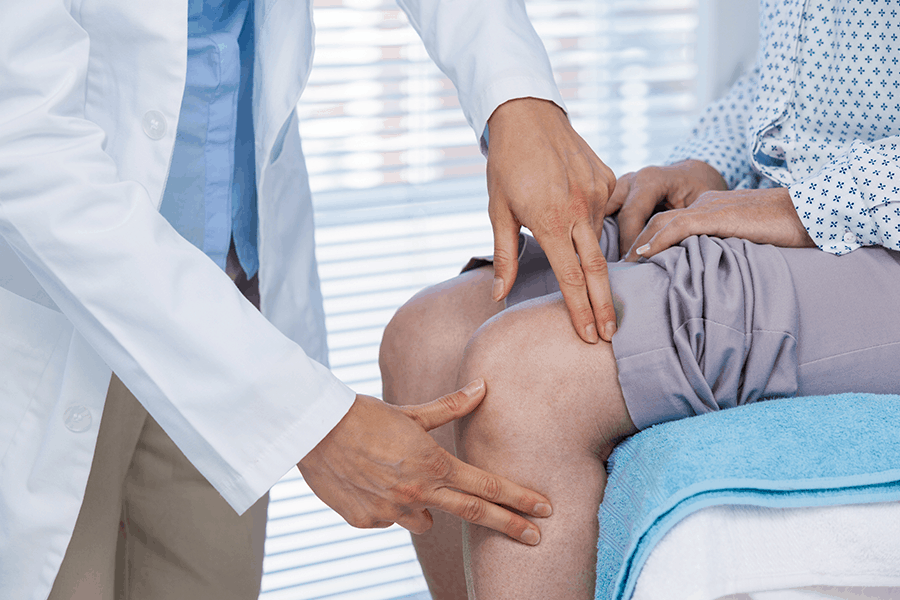 When is the right time for my knee surgery?
When is the right time for my knee surgery?- Am I a candidate for knee replacement?
- Can you wait too long to have a knee replaced?
- What’s it like to have a total knee replacement?
- What’s recovery like after total knee replacement surgery?
Knee replacement surgery, also called knee arthroplasty, is a common surgery to remove the damaged cartilage weight-bearing surfaces of a worn-out knee and replace the joint with a prosthetic made of metal and plastic. But, what is the best age to have a knee replacement surgery?
The general rule of thumb a few years ago was that anyone under the age of 70 was too young for knee replacement surgery, but that thinking has changed.
When is The Right Time for My Knee Surgery?
Knee replacement surgeries are one of the most common and most successful orthopedic procedures in the U.S. with nearly 1 million people benefiting from this technique each year. But the timing of this surgery is a critical component of ensuring the success of this treatment.
We now know that the ideal timing for knee replacement should be based on an individualized patient treatment plan based on:
- Level of pain
- Joint mobility and function
- Radiographic assessment
- The person’s age
- The patient’s quality of life and desire to regain some of that freedom back
- The final decision to proceed with surgery is always the patient’s after a good discussion with a knee joint replacement specialist.
Am I a Candidate for Knee Replacement?
 Knowing whether you’re a candidate for knee replacement depends on several factors. Surgery on the knee usually happens when other types of less invasive treatments, such as physical therapy, medications, bracing, etc. are no longer effective.
Knowing whether you’re a candidate for knee replacement depends on several factors. Surgery on the knee usually happens when other types of less invasive treatments, such as physical therapy, medications, bracing, etc. are no longer effective.
The American Academy of Orthopedic Surgeons (AAOS) reports more than 90% of patients that have knee replacement experience a significant reduction in the pain they experience. They also report extremely low rates of complications or issues after surgery.
The chief indicator that you may need knee replacement is the loss of mobility and pain that stems from arthritis and inflammation. This can be significant; the knee is the body’s largest weight-bearing joint that plays a critical role in our mobility. If your knee is injured or simply worn out from activity, you will likely experience:
- Knee stiffness and pain that slows down or limits your daily activities
- Knee pain that is present even when you are resting and off the joint
- A knee that may look deformed or swollen
After taking X-rays, your doctor will likely see severe joint degeneration and dysfunction. Typically, the clinician may diagnose one or more non-invasive treatments to try before recommending surgery. This could include anti-inflammatories, steroid injections in the joint, icing, physical therapy, or other treatments. When these treatments no longer work and the pain is severe, it’s time to consider a total knee replacement.
Can You Wait Too Long to Have A Knee Replaced?
Yes, because the older you are the more likely you may have co-existing health conditions like diabetes, cardiovascular disease, or other illnesses that might make you a poor candidate for surgery.
As you age, lean muscle mass can decline, so it might be more difficult to rehab and get back to normal function. Also, the issue of quality of life comes into play. With the vast majority of patients experiencing a reduction in the amount of pain they experienced from their bad knees, having knee replacement sooner may mean they get to enjoy more years with less pain.
Every person is different so each patient must have a detailed and informed discussion with a knee replacement specialist to determine the right course of treatment. If you wait too long, the recovery may be slower and more difficult or you may wonder why you spent time suffering when you could have had the surgery years ago. Everyone has their own personal journey and decision-making process in this area.
What’s it Like to Have a Total Knee Replacement?
While there are a few different ways to perform a total knee replacement, the procedure itself has just a few steps:
- The patient is placed under anesthesia and vital signs will be monitored. An incision is made in the knee to reach the joint
- During surgery, the knee joint is prepared by removing the damaged cartilage from the tibia (lower leg bone) and femur (upper leg bone)
- Metal implants are inserted in place of the cartilage that is removed to rebuild the surface of the knee joint
- A spacer made of medical-grade plastic material is inserted so the new metal prosthetic will glide smoothly against the joint
- Metal components are attached to the ends of the femur and tibia
- The incision will be repaired and the patient will leave the operating room to go to recovery
What’s Recovery Like After Total Knee Replacement Surgery?
 If the patient is in good health (more than 90% of joint replacement patients), they may be able to undergo minimally invasive knee replacement in an ambulatory surgical suite. In these cases, the patient normally goes home the same day of their surgery. Patients are encouraged to begin walking as soon as possible, usually directly after their surgery. Patients are typically at the surgical suite for about 5-6 hours for their procedure and are then able to recover at home. This is especially important in the COVID-19 era. It gives many patients a lot of relief to know they can safely have their joint replacement and then recover at home instead of being in a hospital where other diseases are being treated.
If the patient is in good health (more than 90% of joint replacement patients), they may be able to undergo minimally invasive knee replacement in an ambulatory surgical suite. In these cases, the patient normally goes home the same day of their surgery. Patients are encouraged to begin walking as soon as possible, usually directly after their surgery. Patients are typically at the surgical suite for about 5-6 hours for their procedure and are then able to recover at home. This is especially important in the COVID-19 era. It gives many patients a lot of relief to know they can safely have their joint replacement and then recover at home instead of being in a hospital where other diseases are being treated.
Home physical therapy will start the day after surgery. This typically lasts 2 weeks while the patient is in the initial phases of recovery. Outpatient physical therapy usually begins about 2 weeks after the surgical procedure. The physical therapist will work one-on-one with you to strengthen the knee and restore range of motion while reducing scar tissue.
Typically, a knee replacement surgery takes one to two hours and most patients can resume normal light activities within six weeks. Driving can occur in three to six weeks depending on which leg was operated on and how the recovery process is going. Full recovery and return to normal activities such as tennis, aerobics, and other high-intensity activities could take four to six months depending upon the situation and individual patient.
The Louisville Hip & Knee Institute team has successfully performed thousands of knee replacement surgeries. If you’re wondering whether now is the time for knee replacement surgery, talk with our team about your options.

